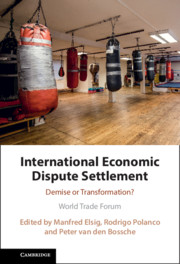Book contents
- International Economic Dispute Settlement
- International Economic Dispute Settlement
- Copyright page
- Contents
- Figures
- Tables
- Contributors
- Preface
- Abbreviations
- 1 Introduction
- 2 Contracting v. Multilateralism in Global Economic Governance
- Part I Current Challenges in International Trade Dispute Settlement
- 3 Sausage-Making at the WTO
- 4 Operationalizing MPIA Appeal Arbitrations:
- 5 Re-Designing the WTO Mediation Mechanism
- 6 Adjudication vs “Frontier Justice” in International Economic Law Disputes
- 7 WTO Dispute Settlement: “Will of the Strongest” or “Rule of Law”? Attempting to View Recent U.S. Actions through the Proper Lens
- Part II Current Challenges in International Investment Dispute Settlement
- Part III New Issue Areas and Dispute Settlement
- Part IV Regional Approaches for International Economic Dispute Settlement
- Index
- References
6 - Adjudication vs “Frontier Justice” in International Economic Law Disputes
The Trump Administration’s Push for Unilateralism in Trade Enforcement
from Part I - Current Challenges in International Trade Dispute Settlement
Published online by Cambridge University Press: 07 August 2021
- International Economic Dispute Settlement
- International Economic Dispute Settlement
- Copyright page
- Contents
- Figures
- Tables
- Contributors
- Preface
- Abbreviations
- 1 Introduction
- 2 Contracting v. Multilateralism in Global Economic Governance
- Part I Current Challenges in International Trade Dispute Settlement
- 3 Sausage-Making at the WTO
- 4 Operationalizing MPIA Appeal Arbitrations:
- 5 Re-Designing the WTO Mediation Mechanism
- 6 Adjudication vs “Frontier Justice” in International Economic Law Disputes
- 7 WTO Dispute Settlement: “Will of the Strongest” or “Rule of Law”? Attempting to View Recent U.S. Actions through the Proper Lens
- Part II Current Challenges in International Investment Dispute Settlement
- Part III New Issue Areas and Dispute Settlement
- Part IV Regional Approaches for International Economic Dispute Settlement
- Index
- References
Summary
In most domestic legal systems, the domestic judiciary has great power over the actors (individuals, business, government entities, and so on) it oversees. By contrast, the international judiciary has traditionally had a more limited role, in part because of the central role of states in the governance of the international legal system (Cheng 1983). States maintain control over their participation in international legal disputes, over the power of the international judiciary to interpret and apply the law, and over the enforcement of international legal decisions. In recent years, however, the role of supranational entities that are hierarchically above states has grown, as international courts and tribunals with a moderate degree of authority have proliferated. While the fears of lost sovereignty expressed by many nationalists are greatly exaggerated, it is true that there has been a slight shift of authority from the national to the supranational through the establishment, by states themselves, of various international dispute settlement bodies.
- Type
- Chapter
- Information
- International Economic Dispute SettlementDemise or Transformation?, pp. 138 - 161Publisher: Cambridge University PressPrint publication year: 2021



